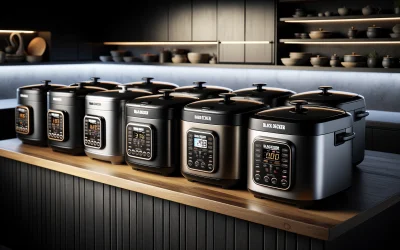As an Amazon Associate I earn from qualifying purchases.
In today’s fast-paced world, convenience in the kitchen is paramount. Cooking rice, a staple in many cuisines, has been streamlined with the introduction of microwave rice cookers. These compact devices promise quick and hassle-free rice preparation without the need for a traditional stovetop or rice cooker. But do microwave rice cookers live up to their claims, and can they truly deliver perfectly cooked rice? In this article, we will explore the inner workings of microwave rice cookers, understand the science behind their operation, and assess their effectiveness in producing consistently delicious results. Whether you’re a seasoned cook or new to the kitchen, understanding how microwave rice cookers work is key to determining whether they are a valuable addition to your culinary arsenal. Let’s dive into the world of microwave rice cookers and discover how they fare in the quest for convenient and perfectly cooked rice.
Do Microwave Rice Cookers Work?
Yes, microwave rice cookers do work and are effective at cooking rice quickly and conveniently. These specialized kitchen tools are designed to harness microwave radiation to heat and cook rice efficiently. Here’s how microwave rice cookers work:
- Heating Mechanism: Microwave rice cookers have a specially designed container with a tight-fitting lid. Inside the container, there is a space for rice and water.
- Water Absorption: When you add rice and water to the container, the microwave rice cooker relies on the microwave’s energy to heat the water within the rice grains. As the water absorbs microwave radiation, it heats up.
- Steam Generation: The heating of water within the rice grains creates steam. This steam circulates within the sealed container, creating a controlled cooking environment.
- Cooking Process: The steam generated within the container cooks the rice evenly and thoroughly. The sealed design prevents steam from escaping and ensures that the rice cooks in a moist and controlled environment.
- Resting Period: After the initial cooking phase, many microwave rice cookers have a resting period. During this time, the rice continues to absorb moisture and evenly distribute it, resulting in a more consistent texture and flavor.
- Perfectly Cooked Rice: The combination of microwave energy, steam, and a sealed environment results in perfectly cooked rice with minimal effort. There’s no need to monitor a stovetop or traditional rice cooker, making microwave rice cookers a convenient option for busy individuals.
It’s important to note that microwave rice cookers come with clear instructions for water-to-rice ratios and recommended cooking times, so following these guidelines is crucial for achieving the best results. Additionally, adjusting cooking times based on your microwave’s wattage may be necessary to ensure that the rice is cooked to your desired level of doneness.
In summary, microwave rice cookers are a practical and efficient way to cook rice quickly and consistently, making them a valuable kitchen tool for many people.
Comparison between the Microwave Rice Cookers and the Rice Cookers
When comparing microwave rice cookers to traditional electric rice cookers, it’s important to consider several factors, including how they operate, their convenience, cooking quality, versatility, and cost. Here’s a detailed comparison:
1. Operation and Cooking Method:
Microwave Rice Cookers:
- They cook rice using the microwave’s heat.
- Typically require manual water-to-rice ratio adjustments.
- Cooking time depends on the microwave’s power and specific quantity of rice.
Electric Rice Cookers:
- Use an electric heating element to cook rice and often include an automatic shut-off or switch to a ‘keep warm’ mode once the rice is done.
- Generally more consistent in cooking due to controlled heat settings.
- Some have fuzzy logic or other advanced features for different rice types and dishes.
2. Convenience and Ease of Use:
Microwave Rice Cookers:
- Generally faster for small quantities of rice.
- Simple to use but require more attention to water ratios and microwave settings.
- Easy to clean, often dishwasher safe.
Electric Rice Cookers:
- Typically “set and forget” appliances; add rice and water, press the button, and it does the rest.
- Larger units can cook more rice at once, suitable for families or meal prepping.
- Cleaning varies by model; non-stick pots are usually easy to clean.
3. Quality of Rice:
- Microwave Rice Cookers: Can produce good quality rice, but results might vary depending on the microwave and user precision with water ratios. Some users might find the texture slightly different from traditionally cooked rice.
- Electric Rice Cookers: Known for producing consistently fluffy and well-cooked rice. Advanced models can adjust settings for different types of rice, yielding optimal results.
4. Versatility:
- Microwave Rice Cookers: Generally limited to cooking rice and possibly steaming some vegetables or other small items.
- Electric Rice Cookers: Many are multi-functional, capable of cooking a variety of grains, steaming vegetables, and even slow cooking or making yogurt in some advanced models.
5. Cost:
- Microwave Rice Cookers: Tend to be less expensive due to their simplicity and smaller size.
- Electric Rice Cookers: Vary widely in price; basic models can be quite affordable, while high-end models with multiple functions can be more expensive.
6. Space and Portability:
- Microwave Rice Cookers: Compact and lightweight, making them easy to store and ideal for small kitchens or travel.
- Electric Rice Cookers: Size varies widely; smaller units are relatively compact, while multifunctional ones can be quite bulky.
Choosing between a microwave rice cooker and an electric rice cooker depends on your specific needs, preferences, and cooking habits. Microwave rice cookers offer a quick, affordable, and space-saving solution for small quantities of rice, while electric rice cookers provide more consistent results and versatility but at a potentially higher cost and larger footprint. Those who value convenience and cook rice frequently may prefer an electric model, while those with limited space or who cook rice occasionally might opt for the microwave version. In either case, both types of cookers have their place in modern kitchens, providing a simplified cooking process for one of the world’s most beloved staples.
Comparison Table: Microwave Rice Cookers and Electric Rice Cookers
Here is a comparison table that outlines the key differences between microwave rice cookers and electric rice cookers:
| Feature/Aspect | Microwave Rice Cookers | Electric Rice Cookers |
| Cooking Method | Uses microwave heat to cook rice | Uses an internal heating element to cook rice |
| Convenience | Quick and easy for small batches; requires monitoring | Set it and forget it; often has automatic shut-off |
| Quality of Rice | Good, but can vary; user needs to adjust water ratios | Consistently high; often better texture and fluffiness |
| Versatility | Limited to cooking rice and steaming some items | Often multi-functional; can cook various grains and more |
| Cost | Generally less expensive | Varies from affordable to expensive for advanced models |
| Size and Portability | Compact and lightweight | Size varies; some models can be bulky |
| Ease of Use | Simple but requires some attention to timing and water ratio | User-friendly with easy settings |
| Cleaning | Usually dishwasher safe and easy to clean | Depends on the model; non-stick pots are easier to clean |
| Energy Efficiency | Depends on the microwave’s efficiency | Generally efficient, especially with keep-warm function |
| Capacity | Typically smaller, good for individual or small servings | Ranges from small to large, suitable for families |
| Advanced Features | Basic functionality | May include timers, different modes, keep warm functions |
This table provides a general overview of the differences between microwave rice cookers and electric rice cookers. Individual models may vary in their specific features and capabilities, so it’s always a good idea to look at the specifications of the particular model you’re interested in. Whether you choose a microwave rice cooker or an electric rice cooker, consider what fits best with your cooking style, the quantity of rice you typically make, and your kitchen space.
Frequently Asked Questions (FAQ’s)
here are some common questions and answers about microwave rice cookers and how they work:
Q: How does a microwave rice cooker cook rice?
A: Microwave rice cookers cook rice by utilizing microwave radiation to heat the water within the rice grains. When the water absorbs microwave energy, it heats up and cooks the rice. The sealed design of the rice cooker traps steam and heat, creating a controlled cooking environment.
Q: Are microwave rice cookers effective at cooking other grains besides rice?
A: Yes, many microwave rice cookers can cook various grains like quinoa, couscous, and pasta. They provide clear instructions for different grains, making them versatile kitchen tools.
Q: Can I use any type of rice in a microwave rice cooker?
A: Microwave rice cookers are suitable for various types of rice, including white rice, brown rice, jasmine rice, and basmati rice. They typically provide instructions for the water-to-rice ratio and cooking times for different rice varieties.
Q: How do microwave rice cookers prevent boil-overs and sticking?
A: Microwave rice cookers prevent boil-overs and sticking by creating a controlled cooking environment. The sealed design traps steam and heat, preventing rice from boiling over. Additionally, many have non-stick surfaces to prevent sticking.
Q: Do I need to adjust cooking times based on my microwave’s wattage?
A: Yes, it’s advisable to adjust cooking times based on your microwave’s wattage. Higher-wattage microwaves may cook rice faster, so following the recommended cooking times for your specific microwave ensures the best results.
Q: Are microwave rice cookers dishwasher-safe?
A: Many microwave rice cookers come with dishwasher-safe components, such as the base, lid, steam tray, and paddle. However, it’s essential to follow the manufacturer’s recommendations for cleaning.
Q: Can microwave rice cookers be used for more than just rice?
A: Yes, microwave rice cookers are versatile and can be used for cooking a variety of dishes beyond rice, including steaming vegetables, preparing oatmeal, and cooking pasta or noodles.
Q: Are microwave rice cookers a suitable alternative to traditional stovetop or electric rice cookers?
A: Microwave rice cookers offer convenience and speed for cooking rice, making them a valuable addition to the kitchen. However, they may not have the same advanced features as traditional rice cookers, such as programmable settings, and may have limitations in terms of capacity.
Q: Do microwave rice cookers require any special maintenance or cleaning?
A: Microwave rice cookers should be cleaned after each use to prevent food residues from hardening. Most are dishwasher-safe, but hand washing is also an option. Some maintenance tips include removing stains with baking soda and water or using a vinegar steam clean to eliminate odors.
Q: Are microwave rice cookers safe to use in the microwave?
A: Yes, microwave rice cookers are designed to be safe for use in microwave ovens. They are typically made from microwave-safe materials that can withstand the microwave’s heat. However, always follow the manufacturer’s instructions for safe use.
These questions and answers should provide you with a better understanding of how microwave rice cookers work and their versatility in the kitchen.
Conclusion to “Do Microwave Rice Cookers Work?”
In conclusion, microwave rice cookers are a testament to the convenience and efficiency that modern kitchen appliances can provide. They work effectively by harnessing the power of microwave radiation to create a controlled cooking environment that results in perfectly cooked rice with minimal effort.
The simplicity of using microwave rice cookers, combined with their speed and consistent results, makes them a valuable tool for busy individuals and families. Whether you’re a student, a professional with a hectic schedule, or simply someone who values convenience in the kitchen, microwave rice cookers can simplify your rice-cooking endeavors.
However, it’s important to note that while microwave rice cookers excel at cooking rice and some grains, they may not offer the same versatility as certain stovetop or electric rice cookers with advanced features. The choice of whether to use a microwave rice cooker depends on your specific cooking needs and priorities.
Ultimately, microwave rice cookers do work, and they work well for their intended purpose. With proper understanding, care, and adherence to cooking guidelines, you can consistently achieve delicious and perfectly cooked rice, elevating your home-cooked meals to a new level of convenience and satisfaction.






